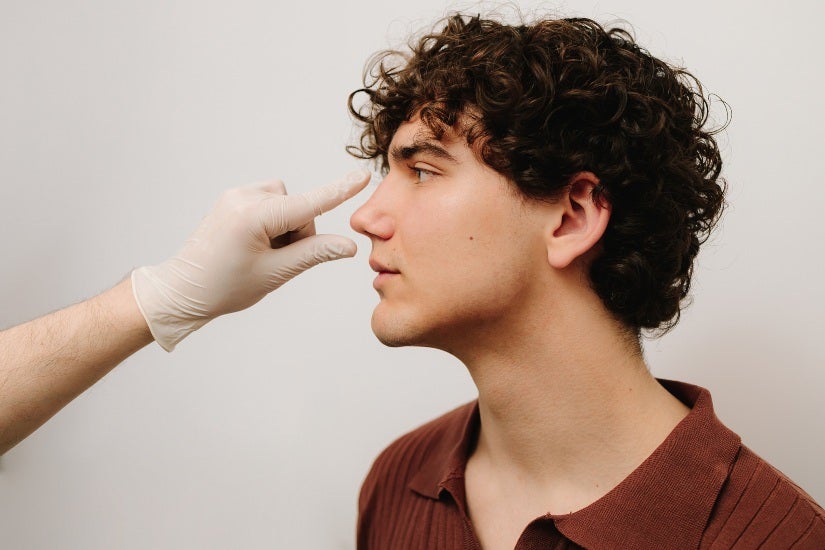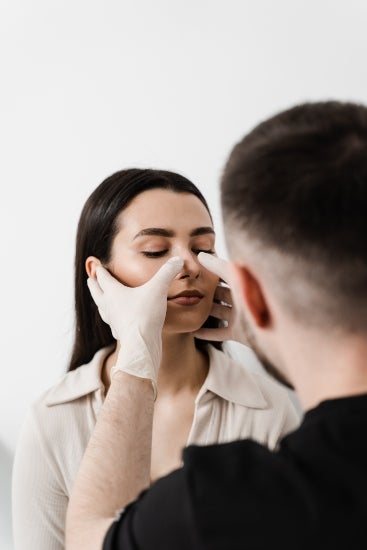Deviated Nasal Septum
Treat Deviated Nasal Septum Symptoms in Jupiter, FL
A deviated nasal septum is a common condition that affects many people, often without them even realizing it. While it might sound complex, understanding what it is and how it can be treated is essential for anyone dealing with chronic nasal issues. At Jupiter Sinus & Allergy, we specialize in diagnosing and treating nasal and sinus conditions, including deviated nasal septum, to help you breathe easier and live better.

What is a Deviated Nasal Septum?
The nasal septum is the thin wall that divides your nasal passages into two nostrils. In a healthy nose, the septum is centrally located, making both nasal passages roughly equal in size. However, in many individuals, the septum can be deviated, meaning it is displaced to one side. This deviation can make one nasal passage smaller than the other, potentially causing a range of respiratory issues.
Causes and Symptoms of a Deviated Nasal Septum
A deviated nasal septum can arise due to various causes, each impacting the nasal structure differently. Understanding these causes, along with the symptoms that may accompany this condition, is essential for identifying and addressing the problem. Below are the primary causes and symptoms associated with a deviated nasal septum, helping you recognize whether this condition might be affecting your quality of life.

Causes
A deviated nasal septum can occur for several reasons:
- Congenital Condition – Many people are born with a deviated septum due to irregular growth patterns during fetal development.
- Injury or Trauma – A nasal injury, whether from a sports accident, car accident, or a fall, can cause the septum to shift out of place.
- Aging – The natural aging process can also cause the septum to deviate over time as the cartilage weakens.
Symptoms
While some individuals with a deviated nasal septum experience no symptoms, others may suffer from:
The most common symptom is difficulty breathing through one or both nostrils, particularly during exercise and when lying down.
A deviated septum can block the sinuses, leading to frequent sinus infections.
The uneven airflow can dry out the nasal passages, leading to frequent nosebleeds.
Chronic nasal congestion or stuffiness, often on one side, is another common sign.
Snoring or sleep apnea can be exacerbated by a deviated septum.
Treatment Options for Deviated Nasal Septum
Managing a deviated nasal septum typically starts with conservative treatments. Your treatment plan depends on the severity of the condition and the symptoms you’re experiencing.
Non-Surgical Options:
- Medications – Decongestants, antihistamines, and nasal corticosteroid sprays can help manage symptoms like congestion and inflammation.
- Nasal Strips – These can be used temporarily to help open nasal passages for better airflow during sleep.
Surgical Options:
- Septoplasty – This is the most common surgical procedure to correct a deviated septum. During septoplasty, the surgeon straightens and repositions the septum to improve airflow.
- Rhinoplasty – In some cases, septoplasty is combined with rhinoplasty, a procedure to reshape the nose for both functional and cosmetic reasons.
FAQs about Deviated Nasal Septum
Symptoms like chronic nasal congestion, frequent nosebleeds, and difficulty breathing through the nose could indicate a deviated septum. A thorough examination by an ENT specialist can confirm the diagnosis.
No, a deviated septum does not heal itself. However, symptoms can be managed with medications. Surgery is the only permanent solution.
Many insurance plans cover septoplasty if it’s deemed medically necessary. It’s best to check with your insurance provider.
Recovery typically takes about 1-2 weeks. Patients should avoid strenuous activities during this time to ensure proper healing.
Take the First Step Toward Better Breathing
Don’t let a deviated nasal septum affect your quality of life. If you’re experiencing symptoms, schedule an evaluation with Jupiter Sinus & Allergy today. Our expert team, led by double board-certified specialist Dr. Sharma, is committed to providing personalized care using the latest medical technology. Take the first step towards better breathing.
